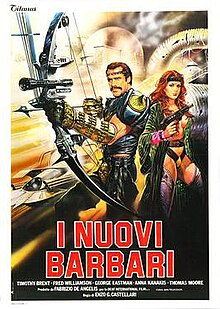The New Barbarians
| The New Barbarians | |
|---|---|
 Italian theatrical release poster | |
| Directed by | Enzo G. Castellari |
| Screenplay by |
|
| Story by | Tito Carpi[1] |
| Produced by | Fabrizio De Angelis[1] |
| Starring | |
| Cinematography | Fausto Zuccoli[1] |
| Edited by | Gianfranco Amicucci[1] |
| Music by | Claudio Simonetti[1] |
Production company | Deaf International Film[1] |
| Distributed by | Titanus[2] |
Release date |
|
Running time | 91 minutes[3] |
| Country | Italy[1] |
| Language | Italian |
The New Barbarians (Italian: I nuovi barbari; also known as Warriors of the Wasteland) is a 1983 Italian post-apocalyptic action film directed by Enzo G. Castellari, written by Castellari and Tito Carpi, and starring Giancarlo Prete and George Eastman. The plot takes place in 2019, following a nuclear holocaust, where two loners among the remains of the starving human race protect a group of pilgrims from a vicious gang bent on genocide.
Plot
[edit]In the year 2019, after a nuclear war, humanity is reduced to a few starving groups. A ruthless gang called "The Templars" constantly raid settlers in an attempt to exterminate everyone in order to purge the Earth. A former Templar, Scorpion, along with his allies, prevents a small band of religious colonists from being massacred by the Templars.
Cast
[edit]- Giancarlo Prete (as Timothy Brent) as Scorpion
- Fred Williamson as Nadir
- George Eastman as One
- Anna Kanakis as Alma
- Ennio Girolami (as Thomas Moore) as Shadow
- Venantino Venantini as Father Moses
- Massimo Vanni as Mako
- Giovanni Frezza as Young Mechanic
- Iris Peynado as Vinya
- Andrea Coppola as Mako's Friend
- Zora Kerova as Moses' Woman
Production
[edit]The New Barbarians was shot outside of Rome in late 1982.[1][4] When discussing 1990: The Bronx Warriors, The New Barbarians and Escape from the Bronx, Castellari stated the three films were written, prepared and filmed in six months.[5]
For the stunts in the film, Castellari stated that he filmed each scene at three different speeds: 24fps, 55 and 96. Castellari stated that this allowed him to "edit the whole sequence in a more interesting way. It gives much more impact to the entire stunt and it actually looks much more impressive and powerful than it actually is."[4]
Release
[edit]The New Barbarians was released in Italy on 7 April 1983.[6] It was released in the United States in January 1984 under the title of Warriors of the Wasteland.[4][7] It was distributed by New Line Cinema.[1]
Reception
[edit]Castellari had positive recollections of making the film, stating that it "was an extremely cheap movie. The budget was incredibly small but I'm quite proud that I succeeded in making a movie shot on the outskirts of Rome."[4] Variety found the film derivative of Mad Max 2 as well as having elements of Hal Needham's Megaforce and other films.[1] Variety felt that Casterllari made a mistake in using slow motion opposed to George Miller's exciting high-speed action scenes, finding that the films car chases "look to be occurring at 25 mph".[1] In Phil Hardy's book Science Fiction (1984), a review found the film to be too derivative of Mad Max 2.[3] The Monthly Film Bulletin described the film as a "shamelessly watered-down, warmed-over" version of Mad Max 2.[8]
In a retrospective review, AllMovie awarded the film two stars out of five, found that the film captures "the true spirit of the low budget rip-off flicks from early 80's, The New Barbarians is neither smart nor original, but a riot for anyone who gets off on Mad Max and all of its the junky followers."[9]
References
[edit]- ^ a b c d e f g h i j k l Willis, John 1985, p. 439: "Review is of 87 minute version viewed in New York on January 15, 1984"
- ^ "I nuovi barbari (1983)". Archivo Cinema Italiano. Retrieved March 23, 2020.
- ^ a b Hardy 1984, p. 382.
- ^ a b c d Fischer 2011, p. 130.
- ^ The New Barbarians [liner notes] (Media notes). Enzo G. Castellari. Death Waltz. DW025.
{{cite AV media notes}}: CS1 maint: others in cite AV media (notes) (link) - ^ Mannikka, Eleanor. "The New Barbarians". AllMovie. Archived from the original on 17 November 2013. Retrieved 17 August 2017.
- ^ Willis, Donald 1985, pp. 158, 204.
- ^ Taylor, Paul (1983). "New Barbarians, The "(I nuovi barbari)"". Monthly Film Bulletin. 50 (588). British Film Institute: 219–220.
- ^ Wheeler, Jeremy. "The New Barbarians". AllMovie. Retrieved November 15, 2015.
Bibliography
[edit]- Hardy, Phil, ed. (1984). Science Fiction. New York : Morrow. ISBN 0-688-00842-9.
- Fischer, Dennis (2011). Science Fiction Film Directors, 1895-1998. McFarland. ISBN 978-0786485055.
- Willis, Donald, ed. (1985). Variety's Complete Science Fiction Reviews. Garland Publishing Inc. ISBN 978-0-8240-6263-7.
- Willis, John (1985). Screen World. Vol. 36. Crown Publisher, Inc. ISBN 0-517-55821-1.


 French
French Deutsch
Deutsch